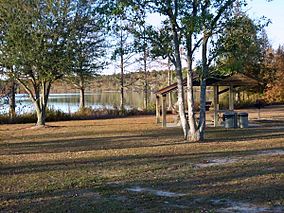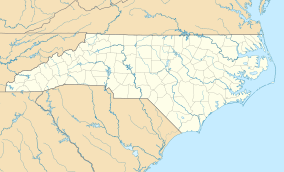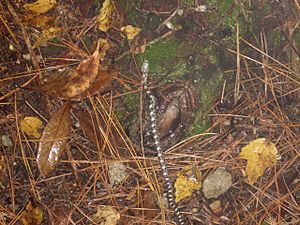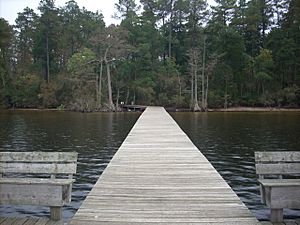Jones Lake State Park facts for kids
Quick facts for kids Jones Lake State Park |
|
|---|---|
|
IUCN Category III (Natural Monument)
|
|

The picnic area with Jones Lake in the background
|
|
| Location | Bladen, North Carolina, United States |
| Area | 2,208 acres (8.94 km2) |
| Elevation | 75 ft (23 m) |
| Established | 1939 |
| Named for | Jones Lake |
| Governing body | North Carolina Division of Parks and Recreation |
Jones Lake State Park is a cool place to visit in Bladen County, North Carolina, near Elizabethtown. It's a state park that covers about 2,208 acres (8.94 km²). This park is home to two special lakes called Carolina bay lakes: Jones Lake and Salters Lake.
You can find Jones Lake State Park north of Elizabethtown on North Carolina Highway 242. It's located in North Carolina's Coastal Plain region. The park is open all year round. You can enjoy fun activities like fishing, swimming, boating, hiking, and picnicking. The park also offers programs to learn about its history and nature.
Contents
Park History
The area around Jones and Salters Lakes was settled a long time ago. People from Europe started moving here in the late 1720s and early 1730s. Jones Lake was first called Woodward Lake. It was named after a local justice of the peace, who was like a judge.
Later, the lake was renamed Jones Lake. This was to honor Isaac Jones. He was a local landowner who gave the land where Elizabethtown was built in 1773. Salters Lake got its name from Sallie Salter. She was an American Revolutionary War heroine. Sallie spied on Loyalists (people loyal to Britain) during the war. They were camped near Elizabethtown by the Cape Fear River.
How the State Protected the Lakes
In the 1800s, the state of North Carolina became interested in these lakes. The North Carolina General Assembly (the state's law-making group) stopped people from claiming private ownership of lakes. Soon after, they passed a law. This law gave the state ownership of all lakes larger than 500 acres (2.02 km²). This applied to lakes in Cumberland, Columbus, and Bladen Counties.
This law led to the creation of Jones Lake, Lake Waccamaw, and Singletary Lake State Parks.
Changes in the Land
For a while, industries like cotton, turpentine, and lumber grew in the area. But this growth was too much for the land to handle. The soil became less fertile, and most of the trees were cut down. Farmers couldn't grow enough crops, and many had to leave their homes.
Building the Park
In 1936, the National Park Service started buying land around Jones and Salters Lakes. They wanted to create a special "recreational demonstration project." During the Great Depression, many young men were out of work. President Franklin D. Roosevelt started the Civilian Conservation Corps (CCC) in 1933.
The CCC employed these young men. They helped build many of the facilities you see at Jones Lake State Park today. The Resettlement Administration managed the land until 1939.
A Park for Everyone
Jones Lake State Park officially opened in 1939. At that time, there was segregation in the United States. This meant that the park was first opened for African American visitors. Black communities in southeastern North Carolina used the park for family reunions, baptisms, and church picnics.
Sadly, parks for African Americans often didn't get as much money. This meant they were not as developed. Because of this, the area around Jones Lake stayed mostly wild and natural. Today, it offers visitors a chance to see two Carolina Bays in a very natural state.
Jones Lake State Park also played a small role in World War II. Soldiers training at nearby Camp Davis used the park for special anti-aircraft training. In 1980, the park became famous when astronomers gathered there to watch a solar eclipse.
Nature at the Park
Jones Lake is one of many Carolina Bay lakes. These lakes stretch from New Jersey to Florida along the Atlantic Coastal Plain. Scientists are still not sure exactly how these lakes were formed.
What we do know is that Jones Lake gets all its water from rain. No streams flow into it. The ground under and around the lake is made of sandy clay and sand. This land is lower than the areas around it and doesn't drain water well. This creates Jones Lake.
Plants of the Bay Forest
A special "bay forest" surrounds Jones Lake. This forest has many bay trees. You'll see trees like the loblolly, red bay, pond pine, and Atlantic white cedar.
Closer to the ground, you'll find plants like huckleberry, leucothoe, gallberry, and pepperbush. In higher areas away from the lake, you might spot turkey oak, blueberry, holly, and longleaf pine.
Animals of the Park
The forests at Jones Lake State Park are home to many common eastern woodland animals. You might see Wild turkeys, white-tailed deer, and rabbits. Wood ducks live on the lake.
In the trees, look for Red-cockaded woodpeckers, red-tailed hawks, yellow-throated warblers, white-eyed vireos, and pileated woodpeckers. The park also has box turtles, fence lizards, pine barrens tree frogs, southern toads, bullfrogs, and carpenter frogs.
A very special insect, Phyllophaga nebulosa, was first found here. This type of June beetle is currently only known to live in this park!
Fun Activities at the Park
Jones Lake State Park is open all year for fun activities. You can go camping, fishing, boating, hiking, and learn about nature and history.
Camping
The park has 20 campsites for families. Each site has a picnic table and a charcoal grill. There are hot water showers at the park bath house. Campsites are available first come, first served. The campground is closed from November through February.
Fishing and Boating
Jones Lake is a great spot for fishing and boating. Boats must have engines under 10 horsepower. You can rent Canoes and paddleboats at the boathouse from Memorial Day to Labor Day.
The lake water is a bit acidic because of decaying plants and peat on the bottom. This means there aren't as many fish. But you can still catch Yellow perch, chain pickerel, and catfish from the shore, pier, or a boat.
Hiking Trails
- Bay Lake Trail: This trail is five miles (8.05 km) long and goes all the way around Jones Lake. It takes you through the beautiful forests. You'll see pond cypress trees covered in Spanish moss. The trail starts at the picnic area and ends at the campground.
- Cedar Loop Trail: This is a shorter nature trail, about one mile (0.6 km) long. It goes through the bay forest and over a sand ridge.
Swimming and Picnicking
Swimming and picnicking are two of the most popular things to do at Jones Lake State Park. There's a large picnic area right by the swimming beach. It has 50 picnic tables, eight grills, and a big pavilion. The beach is open from Memorial Day through Labor Day.
Nearby State Parks
Here are other state parks close to Jones Lake State Park (within 30 miles or 48 km):
- Lumber River State Park (Robeson County)
- Singletary Lake State Park (Bladen County)
 | Bessie Coleman |
 | Spann Watson |
 | Jill E. Brown |
 | Sherman W. White |




